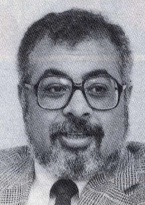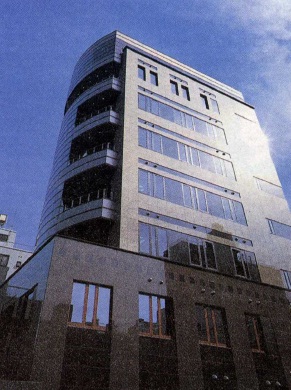by Corky Alexander
Dr. A.A.. (Manny) Sultan was already an accomplished architect when he arrived in Japan in 1974 from his native Egypt. In almost a quarter century since that time, he has earned a Master of Engineering in Architecture (1977) and a Doctorate in the same discipline (1980), both from the prestigious Tokyo University. In 1981, he established his own firm and still serves as President of AAS Associates International (Japan) and Pacific, with operations both in this country and the United States.
As such, he supervises projects dealing in architecture, space planning, interior design and engineering consulting. In the spring of 1995, he won the coveted Tokyo Architectural Design Excellence Award, presented by the Tokyo Association of Architectural Firms, becoming the first non-Japanese to be so honored.
The award was granted for the sophisticated design developed for the Rolex Building in Monzenmaka-cho (see photo). In accepting the award, Sultan enunciated his philosophy of building for the Rolex Building, and all his projects: “Consideration of mere function without global and individual cultural consideration will never develop into good architecture. I try to create architectural spaces, outside and inside, that enrich our lives, help us become more productive and imaginative, and that may be considered a culture itself.”
In a career flourishing more than ever, Sultan was singularly honored last month by the magazine Process: Architecture which devoted its entire March issue to the works of Manny Sultan. The edition included complimentary comments and laudatory articles by no fewer than 19 satisfied clients of AAS Associates. The 150-page publication included a large number of color photographs of projects designed and completed by Dr. Sultan and his industrious staff of architects and engineers.
His staff of 60 is kept busy in projects in 11 countries outside Japan; half his employees work in Japan, the remainder on various global assignments. He has been quoted as saying: “A global architect would freely jump from culture to culture, be able to interpret ‘deas and combine them. I don’t see the lines between countries. I just don’t see them. I belong everywhere. I feel very much at ease in almost any place I go.”
Sultan cites as his inspiration and mentor Hassan Fathy, “a superb Egyptian architect who received the first gold medal given by the International Federation of Architects, awarded for his contribution to architecture, cities and humanity.” Manny was just 17 when he was taken under Fathy’s wing; an intense teacher-student relationship ensued. “Fathy took me to many international architectural conference with him, traveling in many countries…in the course of our relationship, my future and the path of my career was set.”
During those trips, Sultan would arrange his mentor’s schedule, file his papers and slides, carry his suitcases, polish his shoes and make coffee for him. Hassan Fathy died a few years ago, leaving his student behind to continue in his footsteps.
Before coming to Japan, he lived and worked for three years in Denmark, arriving there from his native Egypt. He retains Egyptian citizenship. He holds architectural licenses in Egypt, New York State and, of course, Japan. He began studying architecture at the age of 15 in Cairo, having had the ambition to spend his life in that line since he was a youngster of 8.
One of the most amazing aspects of Dr. Sultan’s “success story” is the fact that he took the entrance examinations for Todai in Japan after only six months in this country. “The university had no facilities for foreign students at that time,” he recalls, “so I had only a few months to study before the exams.”
He has been quoted as saying he turned his room “into a Japanese language camp. There were kanji cards on the ceiling, the walls, all over the floor. It was a challenge. I had put myself into a corner; I had to perform or sink. I believe in that sort of situation, the human mind has no limits.”
That sort of mental discipline and intellectual challenges were brought to the fore when he became active in Mensa, the international society for men and women with exceptional intelligence, founded in England in 1946. These days more than 100,000 Mensa members are in at least 100 countries. Sultan is one of the principal organizers of the Mensa movement in Japan. In the tests for acceptance, he scored in the top 2 percent on the intelligence test.
He says he is member or director of 20 to 30 social clubs and professional societies, including the Japan Institute of Architects. In addition, he is affiliated with the Architectural Institute of Japan, Tokyo Association of Architectural Firms, Tokyo Society of Architects & Building Engineers, the Egyptian Syndicate of Engineers and the American Institute of Architects.
Perhaps the most recent affiliation Sultan has made is as a member of the Foreign Community Supporting Committee of the Young Men’s Christian Association (YMCA), dedicated to raising funds to help Japanese children with special needs.
After an exciting and fulfilling career in his first love of architecture, Dr. Manny Sultan remains enthusiastic and ambitious. He has said that as a global architect, he would be most eager to undertake a new project in a country which he has never visited. He is still like that ambitious 8-year-old boy in Cairo: enthusiatic to build and explore.










